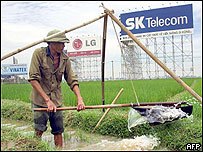In the first of a series of articles from Vietnam - one of the world's last surviving communist states - BBC correspondent William Horsley finds an economic revolution under way.

Traditional lifestyles mix with big business in Hanoi
|
Next year Vietnam will celebrate the 30th anniversary of the end of the war which ended in America's defeat. It will be a chance for the outside world to understand the new Vietnam.
For some, the war left a misleading image of Vietnam as a country peopled by peasant farmers and utterly destroyed.
But today, Vietnam's economy is among the fastest-growing in the region, with annual growth of about 7%, and Saigon, now known as Ho Chi Minh City, is one of the most vibrant cities in South East Asia.
Exports are rising rapidly - mainly because of items like seafood, silk and timber products - while the country is also attracting new investment in cars and electronics.
The Danish head of the European Chamber of Commerce in Hanoi, Preben Hjortlund, said Vietnam was speeding along the same path as South Korea and other East Asian "tiger economies". Vietnam, he predicts, will achieve its economic miracle even faster than they did.
Emerging from conflict
The wars against the French and the Americans took a terrible toll.
Vietnam remained in economic shock for years after the victory over US and South Vietnamese forces in April 1975.
The country was stuck in communist ideology, weakened by new wars involving China and Cambodia, and its relations with the US stayed frozen for nearly 20 years.

Conditions for business are good, according to Nguyen Quoc Khanh
|
But in 1986 a new set of leaders, following China's example, put aside the old dogmas and embraced the free market.
The new policy was called doi moi, meaning renovation. Now doi moi is bearing fruit.
Nguyen Quoc Khanh is one of Vietnam's new breed of entrepreneurs.
He employs 1,700 people in his furniture and interior design company, AA Corporation, which he founded over 10 years ago in Ho Chi Minh City.
Mr Khanh's business has taken off thanks to the rising wealth of Vietnam's new middle classes.
In the past, his best customers were rich expatriates. Now he designs elegant residential suites and offices for wealthy Vietnamese clients.
He has also completed contracts for hotels and restaurants in Sri Lanka and London. Next he aims to break into the lucrative French market.
"Conditions for business are good," said Mr Khanh.
"The usual wages for our factory workers are US$60 to 80 per month here. That's cheaper than China."
Vietnam's communist rulers encourage wealth-creating businesses. There is little, open political dissent because doi moi is delivering rising living standards.
But if doi moi falters, that could quickly change.
Corruption rife
Corruption and cronyism are already widespread, and they could threaten the government's plans.
The World Bank has issued warnings about fraud in Vietnam's large-scale programme of privatising state-owned enterprises.
Senior officials in several government ministries have been arrested or dismissed.

Vietnam recently hosted the Asem conference
|
Vietnam could learn useful lessons from parts of central and eastern Europe, like the Czech Republic, whose economies stalled during their transition from state planning to market economics in the 1990s. Abuses and mismanagement in the process of privatisation were the main problem then - as now in Vietnam.
Luong Van Ly, a senior planning official in the Ho Chi Minh City government, is one of the open-minded technocrats in charge of the doi moi policy.
He said the Communist Party was serious about fighting corruption, and he cited the party's new motto of accountability: "The people should know! The people can debate! The people must have the power to act!"
So it's goodbye Marx, and welcome to the free market.
Mr Ly said that it was now accepted that "fast economic growth always entails a gap between rich and poor, between the haves and have-nots."
The latest phase of doi moi involves more sweeping steps to liberalise the economy and attract more foreign investment.
This month Vietnam moved closer to being recognised as a mature trading nation, completing talks with the European Union on its future entry into the World Trade Organisation.
Vietnam is still poor, and will need years to modernise its infrastructure, even with the international finance that is now pouring in.
But through doi moi, the nation which won an astonishing victory in war looks well placed to win the peace, too.
